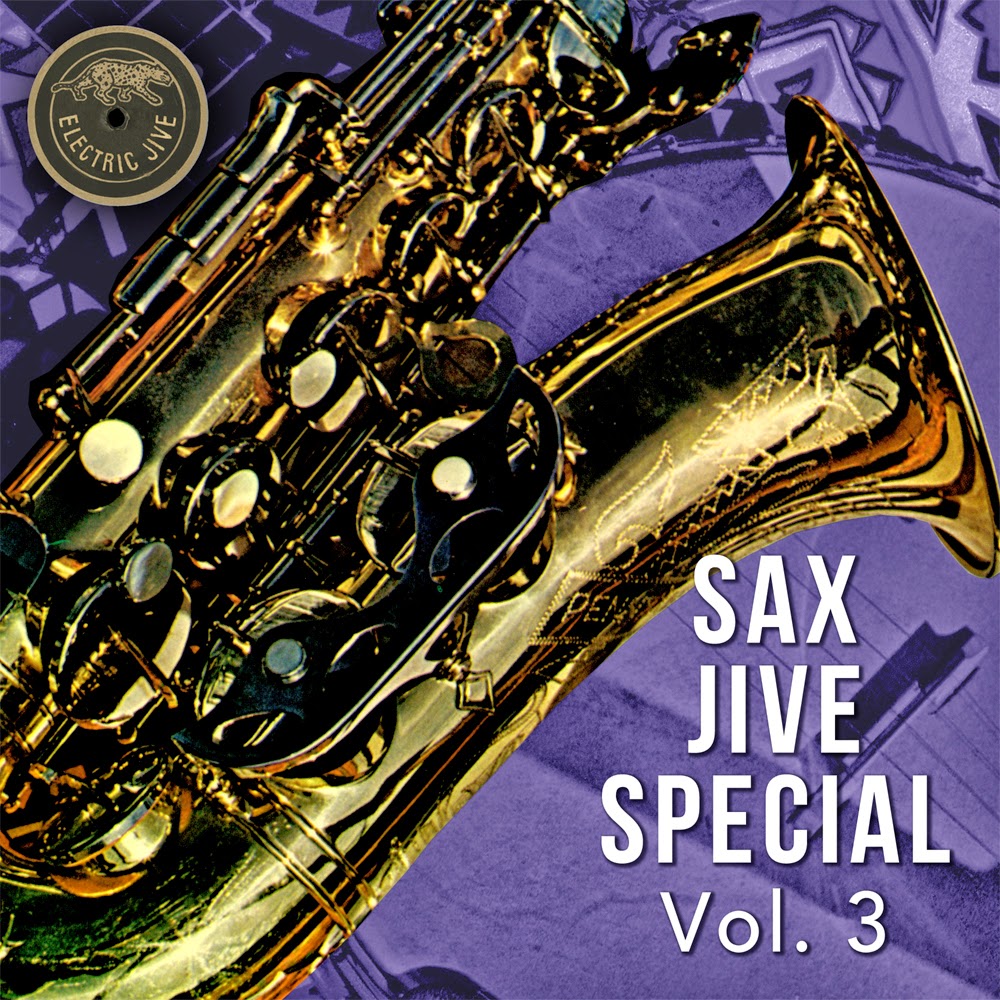Following on from
Accordion Jive Special – Vol. 1, we present the next in our series of South African jive specials. We’re sticking with the instrumental theme for now, and onto another popular form of dance music during the mbaqanga era.
Sax Jive Special – Vol. 3 spotlights 20 more musical gems originally released on 45 rpm singles between 1965 and 1977.


Our opening tune “Hamba Phepha Lami No. 2”, a 1967 recording from the estimable Makgona Tsohle Band, is a remake of a huge vocal jive hit by the Mthunzini Girls. The original recording – featuring Windy Sibeko on lead vocals – was made just a short while before the sax jive reinterpretation, but was already making waves in Durban where broadcaster K.E. Masinga gave the tune regular airplay on the then-Radio Bantu operation. This was not an unusual situation: two other numbers in this compilation, “Tetemuka” (from Abafana Bama Big Bag – or the Big Bag Boys, as they were more commonly known) and “Izulu Liya Duduma No. 2” (another Makgona Tsohle Band masterpiece) had alternate vocal recordings that were hits of their own accord.


Alto saxophonist West Nkosi blows both his trusty horn and a melodica in “Hamba Phepha Lami No. 2”. It appears that there was a fashion for the melodica at the time, as the instrument pops up again in “Theogedi” – an atmospheric 1965 sax jive from Makgolokgolo, in reality a cover name for the same Makgona Tsohle Band – and in the intro to “Tetemuka”, featuring Sipho Bhengu on alto sax duties. Tom Vuma was the lead guitarist for Abafana Bemvunge, the band the backed the Mthunzini Girls who performed “Tetemuka No. 2”. In the early 1970s, Vuma left Mavuthela and moved over to EMI where he began honing a career as a producer, continuing to play his guitar on dozens of vocal and instrumental mbaqanga sessions. One of his sax jive numbers, “Shake Shake No. 500”, has a brilliantly pacey beat and loose sax phrases.


As with Monday’s compilation, I have a few favourites that I feel the need to single out: “Bye Bye” presents the Makgona Tsohle Band at their peak, with excellent rubber-thick melody from rhythm guitarist Vivian Ngubane. “Ezamabone” and “Taxi Driver” are the two numbers that represent the wild ‘jive mabone’ craze of 1973, both of which feature West Nkosi on alto sax but performing with two different instrumental outfits. “Taxi Driver” just edges it for me with its tough mabone drumbeat and rocking guitar rhythms. Another gem is the superbly swift “Hamba Nami”, credited to Big Mukwebo and His Home Boys. ‘Mukwebo’ refers to James Mukwevho – not the alto sax player but in fact the leader and bass guitarist of the Zwino Zwino Boys, the second-tier Mavuthela backup team (behind the first-tier Makgona Tsohle Band) that actually performs this number. (‘Zwino zwino’ is Venda for ‘now now’, denoting ‘ultra-modern’.)


Going back to West now and his 1972 recording “Intambo”, which is marvellous. It’s a beautifully melodic sax-and-accordion-jive tune with yet another of those brilliant spoken intros, which – as far as I can tell – sings the praises of a new Mavuthela recruit, groaner Paulus ‘Mgodlagodla’ Mabunda. Strange! Mavuthela boss Rupert Bopape provides an amusing spoken intro to “Stop Press” by Mathwalimbuzi, featuring ace musician Sello Mmutung fronting the Makgona Tsohle Band with his alto sax. As the 1970s wore on, the beats became harder and tougher – “Is Out Now” (by Albert Motha’s Amazulu Amnyama) and “Take Time” (by Fastos The Great, aka sax jiver David Khanyile) are from that late 1970s period which saw the final evolution of mbaqanga. Eventually the sound was completely usurped by a new mixture of jive, soul and disco.
A big thanks from me to Laurent Dalmasso for providing Electric Jive with 45 rpm transfers of “Intambo” and Shasha and Jackey’s “Makgona Tsohle”.
What are you waiting for? Download this mix and get your groove on! YEBO!! ☺
SAX JIVE SPECIAL – VOL. 3
COMPILED BY NICK LOTAY
01)
MAKGONA TSOHLE BAND – HAMBA PHEPHA LAMI NO. 2 (1967)
02)
WEST NKOSI AND HIS ALTO SAX – BYE BYE (1965)
03)
MAKGOLOKGOLO – THEOGEDI (1965)
04)
ABAFANA BAMA BIG BAG – TETEMUKA (1968)
05)
MAKGONA TSOHLE BAND – IZULU LIYA DUDUMA NO. 2 (1967)
06)
PAULUS MASINA AND HIS SAX – MADUNA (1969)
07)
MAMBAZA NABAFANA BOMSHOSHOLOZO – HILLS OF JIVE (1971)
08)
MAZEICKS – SHAKE SHAKE NO. 500 (1972)
09)
ABAFANA BOMCIKICO – BAROTHO (1973)
10)
WEST NKOSI NABASHOKOBEZI – TAXI DRIVER (1973)
11)
MARKS MANKWANE AND HIS SHALUZA BOYS – EZAMABONE (1973)
12)
BHENGU & BHENGU – EKHONENI (1972)
13)
BIG MUKWEBO AND HIS HOME BOYS – HAMBA NAMI (1974)
14)
WEST NKOSI NABASHOKOBEZI – INTAMBO (1972)*
15)
SHASHA AND JACKEY – MAKGONA TSOHLE (1972)*
16)
HAMILTON NZIMANDE – GIG 74 (1974)
17)
MATHWALIMBUZI – STOP PRESS (1976)
18)
AMAZULU AMNYAMA – IS OUT NOW (1977)
19)
FASTOS THE GREAT – TAKE TIME (1977)
20)
MARKS MANKWANE AND THE SHALUZA BOYS – N.Y. 4 (1976)
Download link:
MF
VOL. 1 |
VOL. 2


































